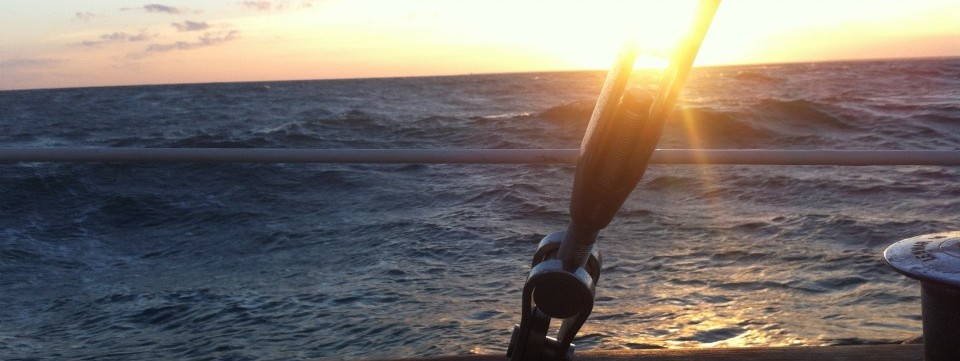Along our passage we saw temperatures reach well into the hundreds. The person off duty would sit under a fan in the salon (on the couches) and read, write, or, if you’re Mike, code. Every once in a while it was polite (aka humane) to pop your head up and ask if the helmsman needed a drink with an ice cube in it.
One morning after breakfast and coffee, I had the first watch starting at 9:30 AM. I felt fine and was steering by hand. We had just made the umpteenth turn of the morning and were set for a wide-open straight away (finally! I could put on Otto VonPilot and relax).
But it happened all very suddenly.
I felt something I had never felt before… my knee gave a slight involuntary jerk. It was very subtle but felt awkward enough for me to glance down. In the time it took to look back up, the blue water in front and yellow grass horizon to the side no longer existed, instead I saw nothing but blurry stars. My vision had completely given way. And that’s when my knees felt like jelly. It was unsettling to feel your body simply fail you. I saw nothing but blackness and felt myself begin to drop against my will. A second later I was crumbled on top of the seat cushions to my left. Half of my body on the floor of the cockpit and my upper torso neatly folded on top of the cushions; my right hand was still precariously on the helm. I yelled for Mike immediately and instantaneously he appeared at my side. My vision was still blurry and I was dizzy. I felt weak. Not tired or sweaty or achey just weak as if I had been fighting a cold for weeks on end. I knew enough to put my head between my knees and breathe deeply. Meanwhile Mike throttled back and took over steering.
This experience brought to attention the need of safety in a form I had never considered; the importance and responsibility to keep yourself healthy. So often, captains focus on safety of passengers & crew, weather, the performance of the boat, safety features… What about keeping yourself hydrated and well fed? If the captain fails to be lucid, is there another person on board? Are they trained well enough to perform simple operations (like throttling back and hailing help)? Thankfully Mike knew what to do. Thankfully Mike heard me when I yelled for him. I don’t know what would have happened if he had his noise canceling head phones on and was unable to hear my call for help. Maybe I would have risen to the challenge by standing up and throttling back… maybe… but maybe… I wouldn’t have been able to regain my composure…
Along our travels Mike and I learned a nonverbal communication for various situations, the most important being that look of when to leave a boring party. No, not really, (we still stink at that signal) more like anchoring. One of our tools, if motoring, is to throttle back. The sound of the engine is a bit loud on Gaia and if I were to throttle back it would signal to Mike, I wanted his attention on deck. Most of the time, it was to slow down for some motor vessels wake or to allow someone to pass… but that was infrequent.
After I regained composure I went down below. Once I was awake enough, I did what any sane kid does… I googled ‘fainting’. And the first thing that popped up on the google search was something called ‘fainting goats’ which ended up being a set of youtube videos of, you guessed it, goats keeling over and fainting… it was oddly adorable. But after I learned of fainting goats, I learned what happened to me was called Vasovagal syncope – Fainting due to lack of blood flow to the brain; usually brought on by standing for long periods of time, heat, or standing up too quickly. Once you experience fainting, you become more susceptible to it. If you’re fit and in good health and you faint more than twice in a month… you should see a doctor… it might indicate a larger risk at hand. Just to be clear I am in no way a doctor. This is simple information gained from googling ‘fainting’.
